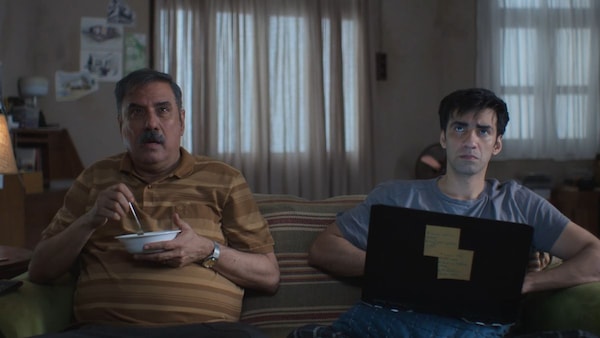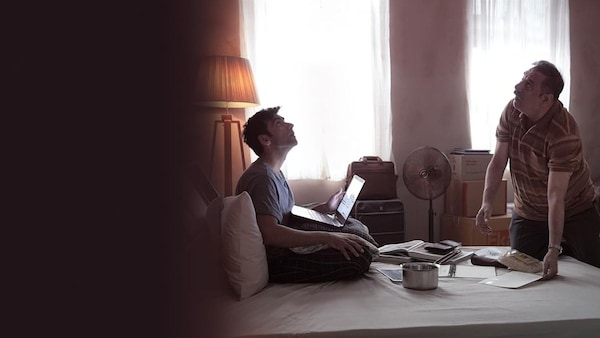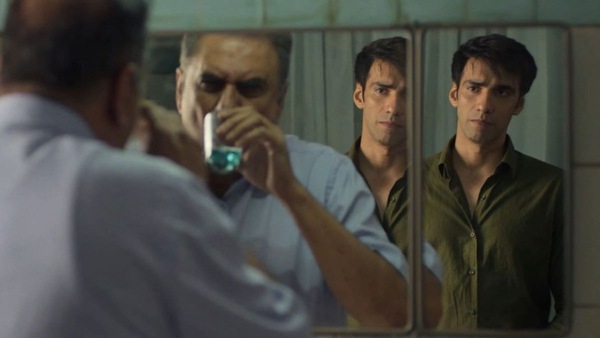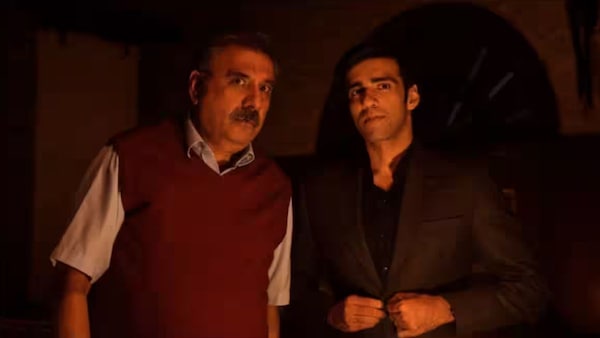The Mehta Boys: Boman Irani’s Directorial Debut Refuses To Take A Pause
The Mehta Boys would have been a better film had it recognised the ingrained potential of its premise. Instead of looking inward, Irani’s debut keeps training its lens on the outside.

Still from The Mehta Boys.
Last Updated: 02.55 PM, Feb 12, 2025
BOMAN IRANI's directorial debut, The Mehta Boys lives in the small moments but eyes the theatricalities. It thrives in the silences but awaits the showdowns. It is designed as a story about grief but takes fewer pauses to grieve. This discrepancy looms so large over the film that it almost undoes that. What keeps it afloat are the performances, but first, the issues.
Amay Mehta (Avinash Tiwary) is a Mumbai-based architect. He lives alone in a semi-rickety building which is prone to the many weather inflections in the city. During monsoon electricity is an issue so is dampness. An introvert at work, he avoids attention to himself till the news of his mother’s death arrives in his office. Amay has to leave immediately and finds his father Shiv (Boman Irani) looking like a broken shell of a man. The plan is set. His sister Anu (Puja Sarup) will take their father to Florida, where she lives with her kids. All Amay has to do is survive a couple of days during the mourning period. But even that gets too much. He returns to his house only for his father to join him there. The Florida plan comes to an unexpected halt once issues with the ticket arise (they were bought on points) and soon the father and the son are fated to share the same space.

No matter the detours, this is where The Mehta Boys was heading all along. An ageing man living with his reluctant son. What happens between them constitutes the film. Irani, who shares writing credits with Alexander Dinelaris (Birdman fame), sets it up well. Unlike the several fictional counterparts of such old men (mostly played by Amitabh Bachchan), Shiv is a reasonable man. His daughter tries to convince him to uproot his life and go with her but he requires little persuasion. His wife and he had made a deal that whoever outlined the other would live with the kids. He wants to fulfil her wishes.
Shiv’s character is also imbued with the sort of cantankerous anguish that is reminiscent of Ricky Gervais’ role in After Life. In fact, much like the show, which stemmed from envisioning a life without a long-time partner, even The Mehta Boys comes across as having originated from a similar space of preemptive grieving (Irani’s wife, Zenobia Irani makes an appearance). This is why the banality of the writing later feels all the more confounding.
We are never explicitly told what had transpired between Shiv and Amay to have caused the rupture. At one level the resistance points to the generic apathy that most sons share with their fathers but for a film entirely leaning on that, such ambiguity hurts. The writers could have sidestepped it by engaging with the grief embedded in the setting, but instead of weaving it into the narrative, it is thornily sculpted and reverse-engineered to advance the plot.

It also does not help that The Mehta Boys swings from one crisis to another without catching its breath. When we see the father and son interact, a regular altercation about bed snowballs into a bitter argument about self-doubt. If better written, the scene would have sung. After all, the only way misgiving flares up is in retrospect but Irani’s film, although attuned to the pleasures of silence, does not earn its excesses.
As a result, the film looks too stacked with big moments while the quiet tragedy of an old man losing his life-long partner is relegated to a footnote. The Mehta Boys only benefits when it resurfaces. Take that scene for instance where Shiv recounts how he knew his wife was the one before their marriage. It is a little moment but Irani is heartbreaking as he commands every inch of the frame with his grief-stricken face.
The other actor who is incredible is Sarup. It is a small role but she brings a thoughtfulness to it (like using a throwaway American accent when speaking in English) that is all the more impressive when compared to Tiwary, the weakest link in the film. A lot of it is tied to the thinness of his character. The metaphors are too broad, the details are too shallow. He is an architect, a man trained to build things, who is struggling with developing a functional relationship with his father. The fluctuations of his personal relationship are drawn a lazy equivalence with his professional upheavals. Both tie up neatly in one of those blatant monologues that on paper only an actor like Tiwary could have sold but in execution, it makes him look like a lesser actor.

The Mehta Boys would have been a better film had it recognised the ingrained potential of its premise. Instead of looking inward, Irani’s debut keeps training its lens on the outside. By doing so, the characters never really become people and a story about mourning gets decorated as a reunion of men. The women, dead and alive, remain outside of the door.
The Mehta Boys is currently streaming on Prime Video.

 Premium
Premium